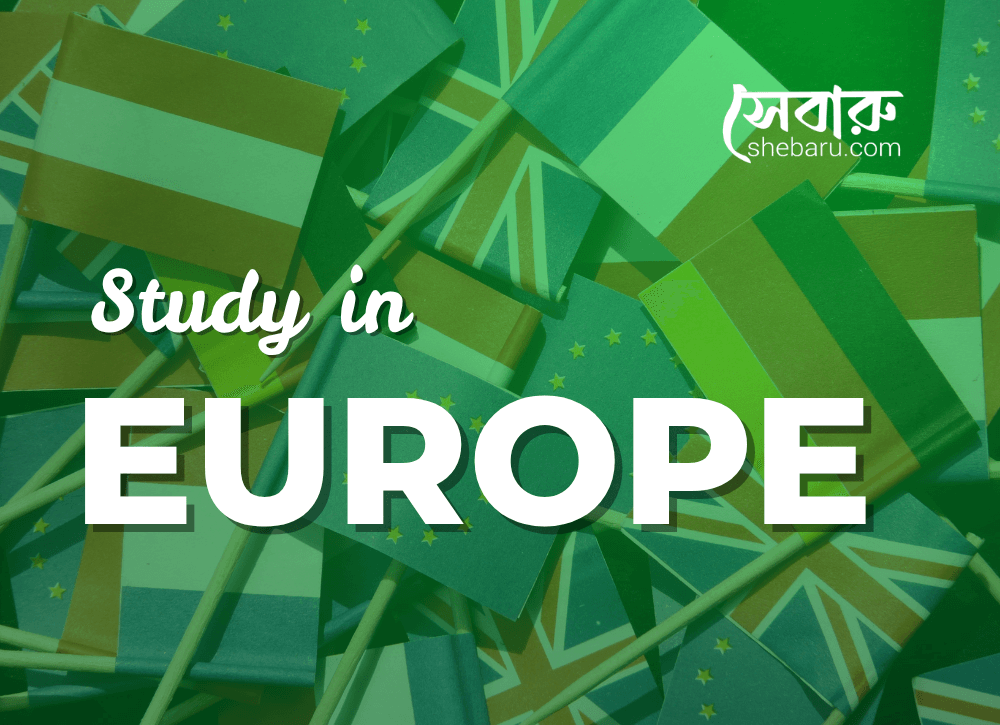Study in EUROPE from Bangladesh
Study in EUROPE from BangladesH
Pursuing higher education in Europe is undoubtedly a valuable investment for international students. Studying in Europe opens the door to a successful career and provides a chance to immerse yourself in a diverse and vibrant culture.
Many European countries offer fully funded scholarships to international students, as well as employment opportunities after graduation. This means you can build a life in Europe even after completing your studies. Europe hosts some of the world’s top-ranking universities, and its collaborative approach to education has fostered a strong international academic community.
Moreover, tuition fees at public universities in Europe are generally lower and more affordable to those in the USA, Canada, or Australia. Students have many job opportunities available, which helps reduce financial difficulties while studying and living in Europe.
Ultimately, graduating from a prestigious European university equips you with a globally recognized qualification and a wealth of practical experience. Therefore, pursuing higher studies in Europe from Bangladesh presents an excellent opportunity for your future.

Top 10 universities in Europe for international students
Below is a list of highly regarded universities for international students, along with key details on courses, IELTS requirements, and average tuition fees (in Bangladeshi Taka, BDT). This table displays the leading universities in Europe that present academic programs, language prerequisites, and typical tuition costs of international students’ well-informed choices.
QS World Ranking | University Name | Offered Courses | IELTS Required | Average Tuition Fee (BDT) |
2 | University of Cambridge | UG, PG, Ph.D. | 7+ | BDT 25,000,000 – BDT 35,000,000 |
3 | University of Oxford | UG, PG, Ph.D. | 7+ | BDT 26,000,000 – BDT 40,000,000 |
6 | Imperial College London | UG, PG, Ph.D. | 6.5+ | BDT 22,000,000 – BDT 36,000,000 |
7 | ETH Zurich – Swiss Federal Institute of Technology | UG, PG, Ph.D. | 6.5+ | BDT 10,000,000 – BDT 15,000,000 |
8 | University College London (UCL) | UG, PG, Ph.D. | 6.5+ | BDT 20,000,000 – BDT 30,000,000 |
10 | University of Edinburgh | UG, PG, Ph.D. | 6.5+ | BDT 18,000,000 – BDT 28,000,000 |
16 | LMU Munich | UG, PG, Ph.D. | 6.5+ | BDT 4,000,000 – BDT 8,000,000 |
17 | King’s College London | UG, PG, Ph.D. | 6.5+ | BDT 20,000,000 – BDT 30,000,000 |
30 | University of Manchester | UG, PG, Ph.D. | 6.5+ | BDT 15,000,000 – BDT 25,000,000 |
44 | Ecole Polytechnique | UG, PG, Ph.D. | 6.5+ | BDT 8,000,000 – BDT 20,000,000 |
Top 10 most Popular Courses in Europe for International Students
International students in Europe often choose programs that offer strong career prospects and employability. Here are the top 10 most popular courses for international students:
- Engineering
- Business Administration & Management
- Computer Science & IT
- Law
- Social Sciences & Psychology
- Environmental Science & Sustainability
- Architecture & Design
- Finance & Economics
- Arts, Humanities & History
- Tourism and Hospitality Management
These courses remain highly popular among international students because of Europe’s diverse academic offerings, rich cultural heritage, and world-class educational institutions.
Top Countries for Bangladeshi Students to Study in Europe
Studying in Europe presents an excellent opportunity for Bangladeshi students to receive a world-class education and expand their horizons. You can select the ideal European country for your higher education experience by matching your academic interests, career goals, and personal preferences.
- Study in the United Kingdom
- Study in Germany
- Study in France
- Study in the Netherlands
- Study in Sweden
- Study in Denmark
- Study in Italy
- Study in Switzerland
Best Courses to Study in Europe for Permanent Residency (PR)
- Information Technology and Computer Science
- Healthcare and Nursing
- Business and Management
- Hospitality and Tourism Management
- Renewable Energy and Environmental Science
- Education and Early Childhood Development
- Logistics and Supply Chain Management
- Skilled Trade and Technical Programs
- Hospitality Management
- Data Science and Artificial Intelligence
Scholarships Opportunities for Bangladeshi Students in Europe
- British Chevening Scholarships
- Erasmus Mundus Programme Scholarships
- Commonwealth Scholarships Commission
- Holland Scholarships
- DAAD Scholarships (Germany)
- Australian Awards Scholarships (Australia)
- Eiffel Excellence Scholarship Programme (France)
- Swedish Institute Study Scholarships (Sweden)
- Italian Government Bursaries Scholarships (Italy)
- Danish Government Scholarships (Denmark)
The Cost of Studying in the Europe for Bangladeshi Students
The cost of education for international students varies based on the program and level of study. Below is a breakdown of the average Annual tuition fees for Bangladeshi students:
| Program | Average Tuition Fee (AUD) | Average Tuition Fee (BDT) |
|---|---|---|
| Bachelor's Degree | $18,000 - $33,000 | BDT 13,05,634 - BDT 23,93,663 |
| Master's Degree | $20,000 - $40,000 | BDT 14,50,704 - BDT 29,01,189 |
| Doctoral Degree | $20,000 - $42,000 | BDT 14,50,704 - BDT 30,46,248 |
| Diploma | $10,000 - $22,000 | BDT 7,25,352 - BDT 15,95,658 |
| Foundation Courses | $15,000 - $33,000 | BDT 10,88,418 - BDT 23,94,521 |
Living Costs in europe for International Students
Although living expenses in Europe are generally lower than in countries like the USA or the UK, international students still need to budget for various costs. The expenses can vary greatly depending on the country and city. Here’s an approximate breakdown:
| Expense Type | Amount in AUD (Monthly) | Amount in BDT (Monthly) |
|---|---|---|
| Accommodation | $500 - $1200 | BDT 32,750 - BDT 78,566 |
| Food & Groceries | $208 - $416 | BDT 13,619 - BDT 27,242 |
| Transportation | $50 - $100 | BDT 3,274 - BDT 6,548 |
| Basic Amenities | $250 - $550 | BDT 16,373 - BDT 36,022 |
| Entertainment | $220 - $380 | BDT 14,408 - BDT 24,888 |
Job Opportunities & Salary for Bangladeshi Students in Europe
Part-Time Job Wage:
International students with valid visas can earn between €7 and €15 per hour, and approximately €280 to €600 per week, depending on the country and type of job.
Average Part-Time Salary:
On average, students earn between €5,000 and €12,000 annually through part-time work.
Full-Time Job Opportunities After Graduation:
- Entry-level positions: Offer annual salaries ranging from €25,000 to €45,000, depending on the industry and country.
- Experienced professionals: Can earn up to €60,000 or more annually, especially in fields such as engineering, IT, finance, and healthcare.
Work Hours:
International students are generally allowed to work up to 20 hours per week during term time, with the option to work full-time during holidays (subject to visa regulations in each country).

Intake in Europe
Intake in Europe refers to the admission periods for universities across European countries. Most institutions offer two major intakes:
- Fall Intake (September or October) for undergraduate and postgraduate courses, and
- Spring Intake (January or February) for specific programs. Application deadlines vary by country and university.
How to Apply for Universities in the Europe
International students can be follow the step by step to study in Europe
- Choose Your Course and University
- Check Admission Requirements
- Prepare Documents
- Submit an Application
- Pay the Application Fee
- Wait for an Offer
- Accept the Offer
- Apply for a Student Visa
- Prepare for Arrival
Required Documents for Application in Europe
- Academic Transcripts
- Proof of English Proficiency
- Passport Copy
- Curriculum Vitae (CV)
- Letters of Recommendation
- Personal Statement or Motivation Letter
- Standardized Test Scores (if required)
- Application Form
- Proof of Financial Support
- Portfolio (if applicable)
- Health Insurance
Why Choose Australia Over Other Countries?
- Diverse cultures and languages with rich history and traditions.
- Wide range of world-class universities across many countries
- Affordable or no tuition fees in many European countries.
- Opportunity to travel easily across multiple countries during studies.
- Strong focus on research and innovation.
- Internship opportunities and part-time jobs
- Post-study work and residency options in many nations.
Europe in Brief
Capital: Brussels (European Union)
Largest Cities:Moscow (Russia)
GDP: $21 Trillion
Top Universities:70+
Language: Multiple (English, French, German, Spanish, etc.)
Population: 741 Million
Students:1.3 Million+
Universities: 4,000+
In Conclusion
Studying in Europe provides numerous benefits, from a rich cultural experience and affordable education to ample job opportunities and a supportive campus life. With its top-ranking universities and diverse study programs, India is an excellent choice for international students seeking a transformative educational journey.
Frequently Asked Questions Regarding Studying in Europe
Admission requirements vary by country and university, but generally, you’ll need:
1)A recognized qualification (e.g., high school diploma for a bachelor’s, bachelor’s degree for a master’s)
2)Proof of language proficiency (usually English, such as IELTS or TOEFL; or the local language if the course is not in English)
3)A strong academic record
4)Additional documents like a motivation letter, recommendation letters, and sometimes an entrance exam or interview
Costs vary widely depending on the country and type of university:
Public universities in some countries (like Germany and Norway) have very low or no tuition fees.
Private universities and programs in countries like the UK, Netherlands, or Switzerland may charge between €3,000 and €25,000 per year.
Living costs typically range from €400 to €1,200 per month, depending on the city and lifestyle.
Yes, international students are usually allowed to work part-time while studying:
1)Most countries allow up to 20 hours per week during the academic term.
2)Full-time work is often permitted during vacations.
3)Students must still maintain their studies and meet visa conditions.
To apply for a student visa:
1)First, gain admission to a recognized university in Europe.
2)Collect required documents: passport, acceptance letter, proof of financial support, 3)health insurance, and sometimes a police clearance or medical certificate.
4)Submit your visa application at the local embassy or consulate of the country where you’ll study.
5)Attend an interview if required and wait for approval before traveling.
Yes, many scholarships are available for international students:
1)Some are funded by the European Union or individual governments.
2)Others are offered by specific universities based on academic merit or financial need.
3)There are also scholarships for specific fields of study or students from certain countries.

